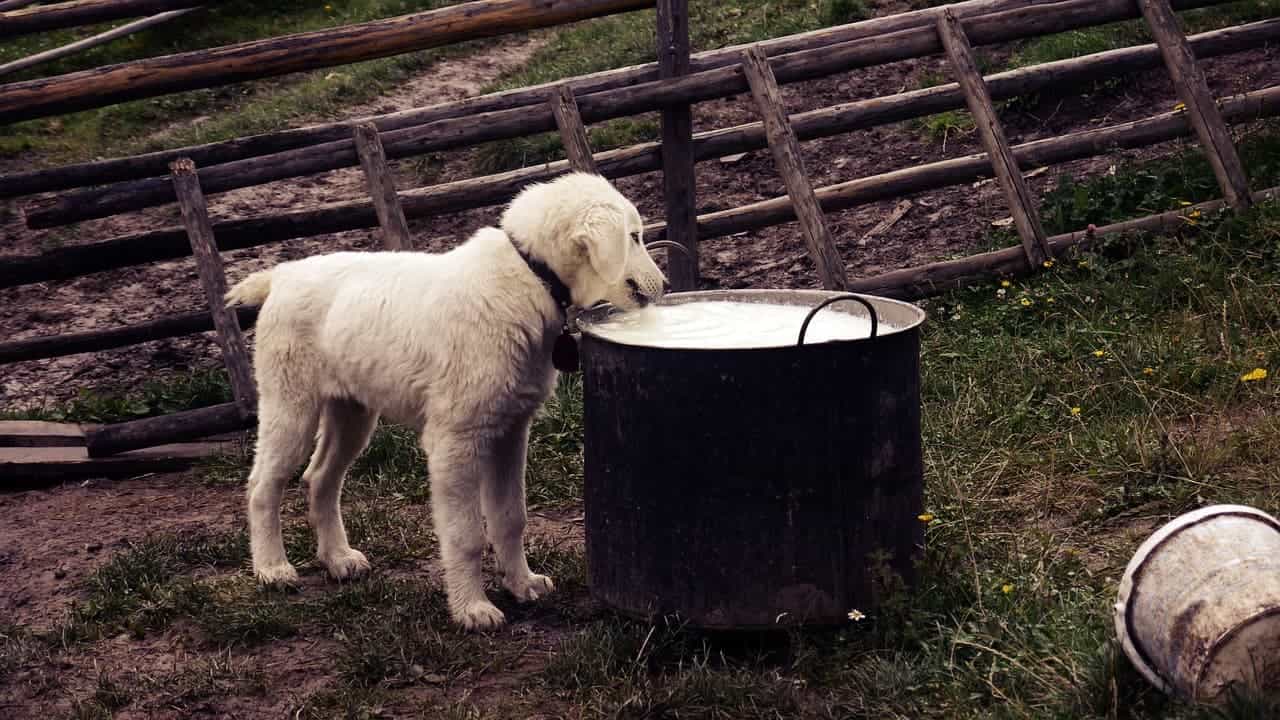
Can I give my dog milk to drink? Can dogs drink milk? Or should they avoid milk like the plague, as it will make them sick and die? These are some of the biggest myths about dogs (or perhaps all mammals) around. Here’s what you need to know if you’re wondering, “Can dogs drink milk?”
Let’s be very clear from the outset: Dogs were not designed to digest milk in their adult lives. They lack the necessary lactase enzyme to break down lactose in a normal digestion process. Not only that, but they also do not possess much of an affinity for drinking another animal’s lactate. If you were wondering, lactase is the enzyme in your digestive system which breaks down lactose into two smaller sugars: glucose and galactose. Your body can then absorb these simpler sugars.
The benefits of milk for dogs. Is milk good for dogs?
Milk is a great source of calcium, phosphorus, Vitamin D, etc. It has many important vitamins and minerals needed by the body regularly to maintain its health. But dog owners should be aware that all this goodness has to come through cow or goat milk to their pets.
Milk is very sensitive, and it can be easily contaminated during the processing procedure, due to which many times it becomes unhealthy for us. The same thing has to be kept in mind while feeding dogs with milk. If you are looking for alternatives, go through this article about healthy food for dogs to know more.
So, the question is: Is Milk Good for Dogs? Well, it has many benefits, but if not taken in the right quantity, they may develop certain health issues.
Milk Allergy in Dogs Let’s start with this important issue. We all know about our allergies to some food items, and when we come across them, we try to stay away from that particular food item. This rule also applies to our pets, but we can never say no to milk as it is a healthy drink and comes with many benefits.
But yes, there are chances of having allergies towards milk like you and your pet may be allergic to it. You should consult a doctor to examine it. If your pet does not have a milk allergy, you should also be careful about the quantity of milk consumed by your pet daily.
Is milk safe for dogs? What can happen if your dog drinks milk?
Dogs are better off consuming meat-based products and fat, not carbohydrates, like it happens with milk. But that’s not the only reason why you should avoid giving your pet cow’s milk. As it turns out, many dairy products contain xylitol, which is very dangerous for dogs. It can cause a drop in blood sugar and even liver failure if consumed in large quantities.
Many other dangers are connected with giving your dog cow’s milk. Milk, especially the raw variant, is known to contain some nasty parasites that can hurt your poor pup. This might be an even more important reason not to give your dog milk than xylitol poisoning.
The only time when you should give milk to your beloved canine friend is when it’s specially made for dogs. This substance is called dog milk and comes from a special breed of cows that only produce this type of milk. It’s also lactose-free, so your dog doesn’t have trouble digesting it.
Lactose-free or not, giving your pet even specially made dog milk can cause a stomach ache, diarrhea, and vomiting. So it’s best to avoid giving any dairy products to your dog unless you want to end up rushing them to the vet.
How to feed milk to dogs and puppies?
- To give your dog cow’s milk, you should warm it up first to avoid digestion problems and stomach upset. Pour some in a bowl and place it in the microwave for around 10 seconds. If the milk is too hot, wait until it cools down before giving it to your dog.
- You can also put the milk in a bowl and place it outside if the weather is hot enough for it to warm up; around 30 minutes should do the trick. Or you could run it under warm water for a few seconds.
- Pick a room or area with a tiled or linoleum floor so that if some of the milk spills, it’ll be easy to mop up.
- Sit on a chair or the floor and place your dog between your legs, facing you.
- With one hand, lift its jowls gently but firmly so that its mouth opens wide.
- Take a small amount of milk in a cup and place it near the dog’s nose. Take care not to touch its nose with the milk, as this might make him gag and start coughing.
- Pour some milk into his mouth in such a way that he swallows it immediately before licking off what spilled around his mouth. If you pour too much in once, he might start coughing.
Conclusion
There are better ways to show your dog love and affection than giving them everyday human foods like cheese and milk. If you have to give your dog dairy products, it is best to consult your veterinarian and see if a specific brand of milk is specially made for dogs. Milk and other dairy products should be avoided in dogs, especially if they have already displayed signs of lactose intolerance, such as vomiting or diarrhea after consuming milk or other dairy-related products.


